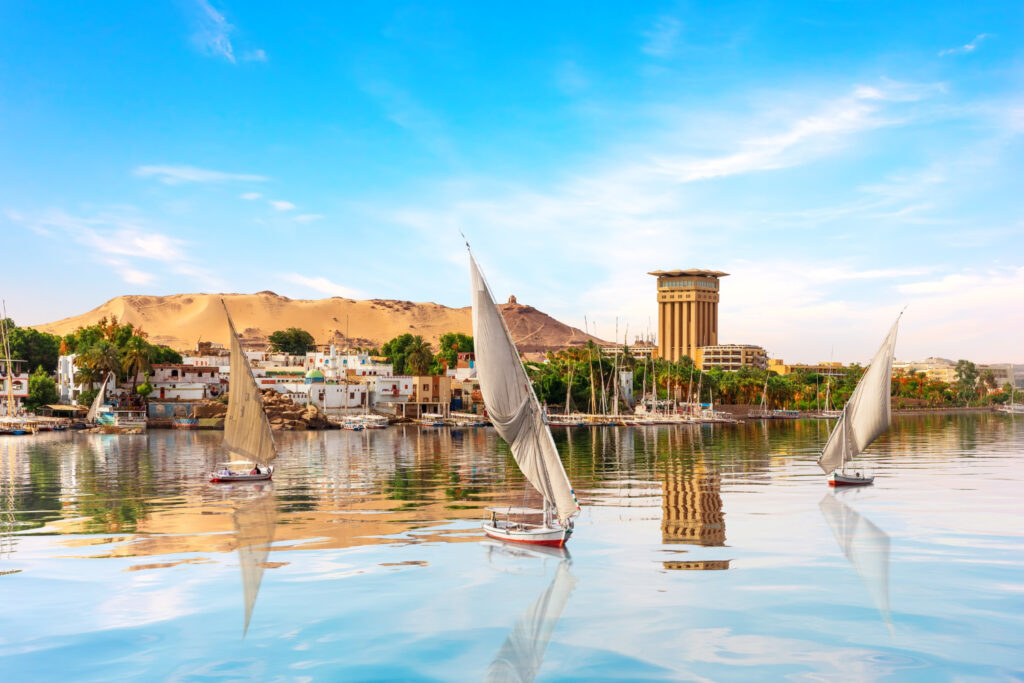Aswan: A Jewel of Egypt
Aswan, a city in southern Egypt, is a treasure trove of history, culture, and natural beauty. Located along the banks of the Nile River, Aswan has been a vital crossroads for trade, culture, and civilization for millennia. It stands as a testament to Egypt’s rich and diverse heritage, offering visitors a unique blend of ancient monuments, serene landscapes, and vibrant traditions.
Historical Significance
Aswan’s history dates back to ancient times when it served as a strategic gateway to Africa and a crucial center for trade and commerce. Known as “Swenett” in ancient Egypt, the city was a bustling hub where goods such as gold, ivory, and exotic animals were traded. Its strategic location at the first cataract of the Nile made it a natural boundary between Egypt and Nubia.
One of the most remarkable historical sites in Aswan is the Philae Temple, dedicated to the goddess Isis. This temple complex, originally located on the island of Philae, was relocated to Agilkia Island to save it from the rising waters of the Nile due to the construction of the Aswan High Dam. The Philae Temple is a masterpiece of ancient Egyptian architecture, with beautifully preserved reliefs and intricate carvings that tell the story of Isis, Osiris, and Horus.
Another significant historical landmark in Aswan is the Unfinished Obelisk. This massive granite obelisk, abandoned in situ due to a crack, provides valuable insights into the ancient stone quarrying techniques used by the Egyptians. If completed, it would have been the tallest obelisk ever erected, standing at a staggering height of about 42 meters (137 feet).
The Aswan High Dam
The Aswan High Dam, completed in 1970, is one of the most impressive engineering feats of the 20th century. This colossal dam, built across the Nile River, has had a profound impact on Egypt’s economy and environment. The dam’s construction created Lake Nasser, one of the largest artificial lakes in the world, which stretches over 500 kilometers (310 miles) into Sudan.
The Aswan High Dam has played a crucial role in regulating the flow of the Nile, preventing devastating floods and ensuring a stable water supply for irrigation and agriculture. It has also facilitated the generation of hydroelectric power, contributing significantly to Egypt’s energy needs. However, the dam’s construction also led to the displacement of thousands of Nubian people and the submersion of several ancient monuments, prompting international efforts to relocate and preserve these cultural treasures.
Nubian Culture and Heritage
Aswan is also a vibrant center of Nubian culture, with a rich heritage that is deeply intertwined with the city’s history. The Nubian people, known for their distinctive customs, language, and traditions, have inhabited the region for thousands of years. Visitors to Aswan can explore the colorful Nubian villages, characterized by their brightly painted houses adorned with intricate geometric patterns and motifs.
The Nubian Museum in Aswan is a must-visit for anyone interested in learning more about this unique culture. The museum houses a vast collection of artifacts that trace the history and heritage of the Nubian people from prehistoric times to the present day. Exhibits include pottery, jewelry, textiles, and tools, as well as informative displays on Nubian folklore, music, and dance.
Natural Beauty and Scenic Landscapes
Aswan’s natural beauty is truly breathtaking, with the Nile River winding its way through picturesque landscapes and verdant islands. One of the most enchanting spots in Aswan is the Aswan Botanical Garden, located on Kitchener’s Island. This lush oasis, filled with exotic plants and trees from around the world, offers a tranquil retreat from the hustle and bustle of the city.
Another popular attraction is the Elephantine Island, the largest island in the Nile at Aswan. The island is home to ancient ruins, including the Temple of Khnum, dedicated to the ram-headed god of creation. The island’s name is derived from the large granite boulders that resemble elephants and are scattered along its shores.
For those seeking adventure and outdoor activities, Aswan offers a range of options. Visitors can take a traditional felucca boat ride on the Nile, exploring the river’s serene waters and enjoying stunning sunsets. The nearby Nubian Desert provides opportunities for camel trekking and desert safaris, allowing travelers to experience the unique landscapes and wildlife of the region.
Modern Aswan
In addition to its historical and natural attractions, Aswan is a thriving modern city with a bustling market (souk) and a lively cultural scene. The Aswan Souk is a vibrant marketplace where visitors can shop for traditional crafts, spices, perfumes, and souvenirs. The market’s colorful stalls and lively atmosphere provide a sensory feast for visitors, offering a glimpse into the daily life and culture of Aswan.
Aswan is also known for its warm hospitality and welcoming people. The city’s hotels and resorts offer a range of accommodations, from luxurious five-star establishments to charming boutique hotels. Many of these establishments are located along the Nile, providing stunning views and a peaceful ambiance.

Festivals and Celebrations
Aswan hosts several festivals and cultural events throughout the year, celebrating its rich heritage and traditions. One of the most notable events is the Aswan International Film Festival, which showcases a diverse selection of films from around the world and promotes cross-cultural exchange.
The Moulid of Abu El-Haggag, a traditional Sufi festival, is another important celebration in Aswan. This vibrant event, held in honor of the city’s patron saint, features colorful processions, music, and dance, attracting both locals and visitors.
Conclusion
Aswan is a city that captivates the hearts and minds of all who visit. Its rich history, cultural diversity, and stunning natural landscapes make it a truly unique destination. Whether exploring ancient temples, sailing on the Nile, or immersing oneself in the vibrant Nubian culture, Aswan offers an unforgettable journey through time and tradition. It stands as a testament to the enduring legacy of Egypt’s past while embracing the vibrancy and dynamism of the present.





